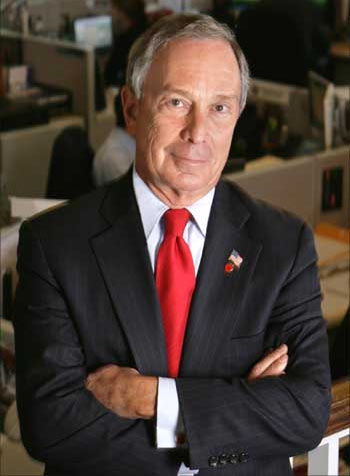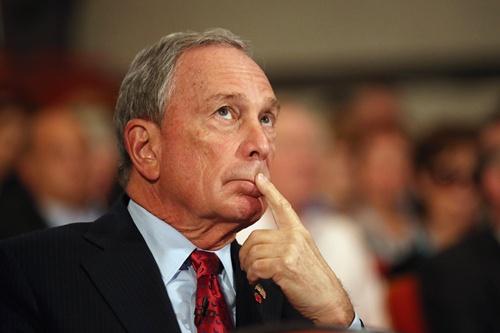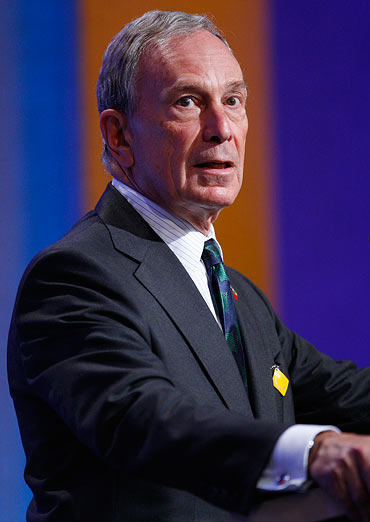 | « Back to article | Print this article |
How I became a billionaire
"Don't worry if you don't know what you want to do with your life just yet. I sure didn't when I was in your shoes 50 years ago this month."
"Arrive early. Stay late. And in-between, work harder than everyone else. Because the harder you work, the more opportunities you'll have."
"Life is short. Do not be afraid of failure. Feed your passions. Follow your dreams. And work like crazy to fulfil them."
Entrepreneur, philanthropist and former mayor of New York, Michael Bloomberg, delivered a fascinating commencement speech filled with anecdotes at Koc University late last week.
We bring you the full transcript:
Trust Michael Bloomberg to give you the unsuspecting advice when you most deserve it.
The entrepreneur and largest stakeholder of one of the world's largest financial and media firms Bloomberg LP in one of his interviews had said that the key to success lies in 'taking less bathroom breaks'.
No wonder why his advice and speeches are a hot favourite among students, financial analysts, job seekers and entrepreneurs-to-be.
So what happens when the business magnate is invited to deliver a commencement address to graduates of Koc University in Istanbul, Turkey?
He leaves them with powerful lessons from his own life and career.
Read on for the full transcript below of Bloomberg's speech:
This is my first visit to Koc University, and I want to thank you for offering me such a warm welcome.
I have visited Istanbul several times before, and I always enjoy coming here.
There is an energy and excitement here that makes me feel right at home.
Istanbul and New York are two of the most diverse cities in the world and that is why they are two of the greatest cities in the world.
Each city is a national treasure that aspires to be, in both culture and commerce, the center of the world. We are both harbor cities that face out onto the world, and welcome the people of the world to our shores.
While New York's history cannot compare to Istanbul's, both cities are more interested in shaping the future than living in the past.
That is why all of you came to this great university -- to take expand your horizons, and take control of your futures.
Don't worry if you don't know what you want to do with your life just yet.
I sure didn't when I was in your shoes 50 years ago this month.
In 1964, I earned my degree in electrical engineering, but I never worked as an engineer.
I went to business school thinking I would learn how to manage a manufacturing company, or maybe a real estate business. Instead, I ended up taking an entry-level job in the financial industry, which I knew nothing about. But I loved that job right up until the day I was fired.
Getting fired turned out to be one of the best things that ever happened to me.
If I hadn't gotten fired, I may never have started my technology company.
And if I hadn't started my company, I would never have run for mayor of New York, been able to devote so much of my life to philanthropy, or have been asked to speak to you today.
People sometimes ask me: What's the key to success?
Well, it is not planning out your whole career on the day you graduate from college.
Life is not linear, and if you expect it to be you're going to be disappointed.
Instead of putting your energy into making a long-term plan that will inevitably fall apart, roll up your sleeves and get to work at whatever job you find -- no matter how low-level it may be.
From my experience, hard work is the single most important factor in determining your success.
At my first job, I was the first one into the office every morning. That allowed me to talk with the CEO, who was always there early.
Arrive early. Stay late. And in between, work harder than everyone else. Because the harder you work, the more opportunities you'll have.
Hard work will carry you a long way. But there will be points in your career when you'll also have to decide whether to stay the course, or take a risk.
Whether to listen to reason, or follow your passion, whether to keep what you've got, or give it up for something that may not work out.
Most of your friends, families, and colleagues will tell you to play it safe.
When I was thinking of starting my company, everyone told me I'd fail and that I was crazy.
I was able to prove them wrong on at least one of those points.
Twenty years after I started my company, when I was thinking of running for Mayor of New York, they said the same thing.
Always listen to other people's advice, but don't always follow it. Sometimes, you have to follow your gut.
Please click NEXT to continue reading...
'True success is not measured by societal convention; but by our own conscience'
The fact is, people tend to be risk-averse, and that's not a bad thing.
It's a survival instinct.
The human species has survived for 200,000 years because our brains are wired for caution.
But the human race has advanced, especially over the past 1,000 years, because our brains are also wired for discovery and because people have been willing to risk their livelihoods to explore new worlds and new ideas.
The great scientists and philosophers, the inventors and entrepreneurs, the artists and authors -- all could have opted to play it safe.
But instead, they changed the course of history -- sometimes at great personal expense.
Of course, not every risk proves to be a success, at least in the conventional sense.
But true success is not measured by societal convention; it is measured by our own conscience.
Few people regret chasing a dream.
Many people are haunted by how the chase might have turned out.
So when you are faced with a decision about whether to take a risk with your career I want you to remember this: Life is short. Do not be afraid of failure. Feed your passions. Follow your dreams. And work like crazy to fulfil them.
Now, I realise that finding a job in today's economy is not easy. But you will find one.
It may not be in your chosen field, and it may not pay as much as you would like. When I was first hired, I had to take a loan against my salary so that I could buy a few suits.
Eventually, you will find a job. And chances are, it will be in a city -- maybe here in Istanbul or maybe even in New York.
Because more and more, the global economy is a becoming an urban economy.
In fact, your generation is the first generation to come of age in a truly urban world.
As you head out into the world, it's worth taking a moment to think about what that means.
One hundred years ago, two of every 10 people on Earth lived in urban areas.
As of 1990, it was less than four in 10.
Today, it is more than half, and by the time you graduates reach your late 50s, about 70 percent of the world's population will live in urban areas.
In America, they call young people who were born in the 1980s and 90s the 'Millennial Generation.' But I think of you graduates as the world's first 'Metropolitan Generation.'
In the decades ahead, most of you will live in metropolitan areas and as a result, the world will increasingly be shaped by metropolitan values -- including an appreciation of diversity and tolerance. That is a hopeful development for humanity -- and for peace among nations.
As your generation -- the Metropolitan Generation -- assumes leadership positions, not only will cities become more culturally influential, they will also become more economically and politically powerful.
Together, I believe those shifts will position cities to re-shape geo-political relations in the 21st century.
When you think about it, a global shift toward cities makes perfect sense.
We tend to organise history around the wars fought between nations and empires.
But the truth is, in the whole history of human development, what has occurred within cities has been far more powerful, and far more permanent, than what has occurred between empires.
Please click NEXT to continue reading...
'The challenge you face is to build modern cities for a new urban civilisation'
Great empires, including the Ottoman Empire, have come and gone, but the progress pioneered in cities has endured.
Remember: Democracy was born in ancient Athens.
Capitalism developed in Florence and Venice during the Renaissance. Industrialism took root in Birmingham and Manchester.
And throughout time, much of what we know about science and technology grew out of discoveries made in cities, including here in Istanbul.
More so than any prince or potentate, or any prime minister or president, industrious and inspired people living and working in cities have made the world we know today.
If the 19th century belonged to empires, and the 20th century belonged to nation-states, which were created to defend against empires the 21st century will increasingly belong to cities. Because as nation-states struggle to provide leadership on the major issues of our day, it will be up to cities to step in and fill the void and it will be up to all you -- the Metropolitan Generation -- to lead the way.
The work of pioneering new solutions is already well underway in cities.
Around the world, mayors are turning city halls into laboratories and conducting experiments that are aimed at solving the world's most difficult problems.
In New York City, we pioneered new ways of fighting poverty, tackling climate change, enhancing education, reducing crime, and improving public health.
Many of those changes were strongly opposed by a variety of industry groups, but we didn't cave in to pressure.
I'll give you one example: When we proposed banning smoking in bars and restaurants, people said that we would kill the restaurant industry, and drive tourists away.
Instead, after we put the ban in place, the restaurant and bar industry boomed and tourism increased by about 15 million annual visitors.
Today, if you tried to repeal the ban, there would be a huge public uproar! New Yorkers would never stand for it!
When people saw that a smoking ban could work in New York City, countries around the world began adopting it, including Turkey. And that just goes to show you how innovative policies pioneered in cities can spread across continents and change the world for the better.
To encourage this kind of innovation, my foundation is running a competition that we call, 'The Mayors Challenge.'
We've invited mayors from both Europe and America to develop innovative new solutions to important problems.
We select the most promising ideas and the winners receive a total of about $25 million, or around 52 million Turkish Lira, to implement them.
The response from mayors has been overwhelming.
In Europe, 155 cities from 28 countries, including Turkey, entered the competition.
That shows the enormous appetite cities have for problem-solving innovation and, as a result, the amount of policy experimentation happening in cities is unprecedented.
Now, that's great news because the urgency of urban problems is going to increase over time, as your generation, the Metropolitan Generation, flocks to cities.
It will be no small challenge to accommodate so many more people -- often in cities that are built on ancient foundations with aging infrastructure.
But that is the challenge you face: To build modern cities for a new urban civilisation.
They must be strong enough to welcome all who come seeking opportunity and smart enough to provide the educational and economic opportunities that people need to escape poverty and seek prosperity.
It certainly won't be easy, but I know you can succeed because I have seen the innovation that flourishes both in cities and in your generation.
Today, as you graduates begin a new phase in your life's journey, I wish you the best of luck.
And whether or not your journey brings you to a city I hope that you will carry with you the values that make this university, and this city, great: An openness to the world, a tolerance for diversity, and a thirst for knowledge.
I also hope that all of you will, at some point in your lives, visit my home city of New York and that some of you will even live there.
New York City has a large Turkish community, and no shortage of great Turkish restaurants.
But today, before you look beyond this campus, enjoy the celebration with your fellow students, your professors, and your family members.
You've earned it! Congratulations!
Thank you for the opportunity to share this great day with you.


